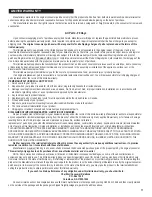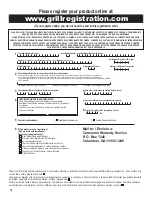
•
A frosty regulator indicates gas overfill. Immediately
close LP cylinder valve and call local LP gas dealer
for assistance.
•
Do not release liquid propane (LP) gas into the
atmosphere. This is a hazardous practice.
•
To remove gas from LP cylinder, contact an LP dealer
or call a local fire department for assistance. Check
the telephone directory under “Gas Companies” for
nearest certified LP dealers.
LP Cylinder Exchange
•
Many retailers that sell grills offer you the option of
replacing your empty LP cylinder through an
exchange service. Use only those reputable
exchange companies that inspect, precision fill, test
and certify their cylinders.
Exchange your cylinder
only for an OPD safety feature-equipped cylinder
as described in the “LP Cylinder” section of this
manual.
•
Always keep new and exchanged LP cylinders in
upright position during use, transit or storage.
•
Leak test new and exchanged LP cylinders
BEFORE connecting to appliance.
LP Cylinder Leak Test
For your safety
•
Leak test must be repeated each time LP cylinder is
exchanged or refilled.
•
Do not smoke during leak test.
•
Do not use an open flame to check for gas leaks.
•
Appliance must be leak checked outdoors in a well
ventilated area, away from ignition sources such as
gas fired or electrical appliances. During leak test,
keep appliance away from open flames or sparks.
Use a clean paint brush and 50/50 soap and water
solution. Use mild soap and water.
s
Do not use
Household cleaning agents. Damage to gas train
components can result.
Connecting Regulator To The LP Cylinder
1.
LP cylinder must be properly secured onto appliance.
2.
Turn control knob to OFF position.
3.
Turn LP cylinder OFF by turning hand-wheel
clockwise to a full stop.
4.
Remove protective cap from LP cylinder valve. Always
use cap and strap supplied with valve.
Safety Relief
Valve
OPD Hand Wheel
Type 1 outlet with
thread on outside
Strap and Cap
O f
f C
lockwise
Do not use a POL transport plug (A)
(plastic part with external threads)! It
will defeat the safety feature of the
valve.
5.
Hold regulator, insert nipple (B) into LP cylinder valve.
Hand tighten coupling nut, holding regulator in a
straight line (C) with LP cylinder valve so as not to
cross thread the connection.
Nipple has to be centered
into the LP cylinder valve.
A
B
Brush soapy solution onto the shaded areas.
5
WARNING
If “growing” bubbles appear do not use or move the
LP cylinder. Contact an LP gas supplier or your fire
department!
WARNING
Do not attempt to repair or alter the
hose/valve/regulator for any “assumed” defect. Any
modification to this assembly will void your warranty
and create the risk of a gas leak and fire. Use only
authorized replacement parts supplied by
manufacturer.






































